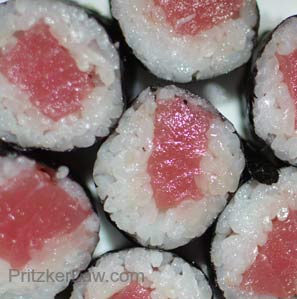Fast Facts:
- Strand Salmonella Paratyphi B variant L(+) tartrate(+) has been linked to raw tuna found in sushi
- As of May 21st, a total of 53 people have been sickened in 9 states, no deaths have been reported
If you suspect you were sickened by eating raw tuna in sushi call 1-888-877-8900 - The illness onset dates range from March 5, 2015, to May 3, 2015
- Salmonella presents a unique PFGE pattern that has not yet been seen by CDC’s PulseNet database
2015 Raw Tuna Salmonella Outbreak
The CDC and local public health officials are investigating a multi-state Salmonella Paratyphi B outbreak. The illness has been linked to the consumption of raw tuna, of the 37 individuals interviewed by investigators 21 reported eating spicy tuna sushi within the week prior to the onset of illness. It is not known whether the tuna was prepackaged or not.
“Even fresh fish, particularly if caught in areas contaminated waters or processed under unsanitary conditions, can contain deadly bacteria. The seafood industry is well aware of this risk and needs to do a lot more to protect the innocent consumer.”
This is not the first nationwide foodborne illness outbreak associated with sushi. In 2012 Moon Marine USA was responsible for sickening over 390 people across the US with Salmonella Bareilly and Salmonella Nchanga. Serving as a further indication of the lack of concern exhibited by the seafood industry in matters of food safety.
People sickened in the 2015 outbreak range in age from under 1 to 83 with the median age of 31. This is relatively rare for a foodborne illness outbreak; generally, those most susceptible to food poisoning are the very young, the elderly, and people who are immunocompromised.
Thus far, this outbreak has sickened people in 9 states the individual state case count tallies are as follows:
- Arizona – 10
- California – 31
- Illinois – 1
- Mississippi – 1
- New Mexico – 6
- South Dakota – 1
- Virginia – 1
- Washington – 1
- Wisconsin – 1
- Total ill persons – 53
PulseNet System
Due to the nationwide nature of this illness, public health investigators are using the PulseNet system to identify cases related to this outbreak. The PulseNet system uses a technique called isolated called pulsed-field gel electrophoresis, or PFGE, to capture a DNA “fingerprint” from Salmonella bacteria, collected from someone sickened, and then compares this to other fingerprints to determine if they are part of the same outbreak. This is why it is essential to speak with someone from your state’s health department after being diagnosed with a foodborne illness.
Our Salmonella lawyers represent food poisoning victims throughout the United States and have recovered millions for our clients. Attorney Fred Pritzker and his team have won millions for individuals sickened by food products. To contact them about a spicy tuna roll lawsuit, call 1-888-377-8900 (toll-free) or submit our free consultation form.
